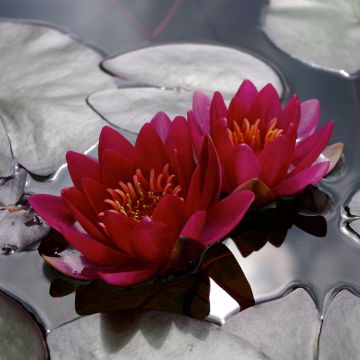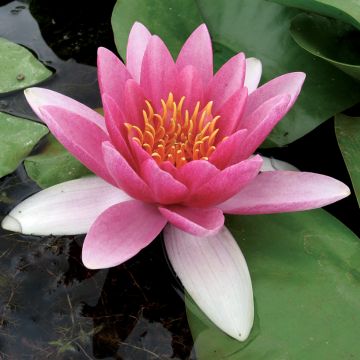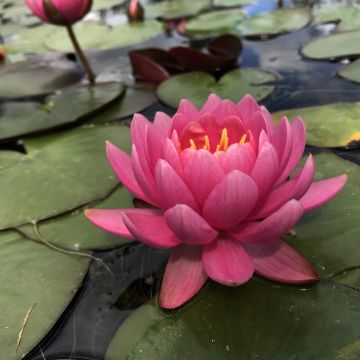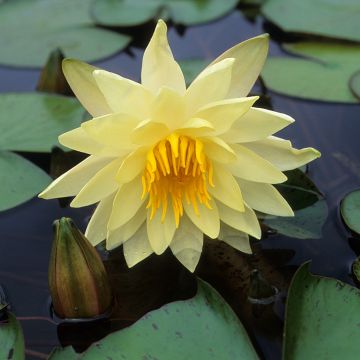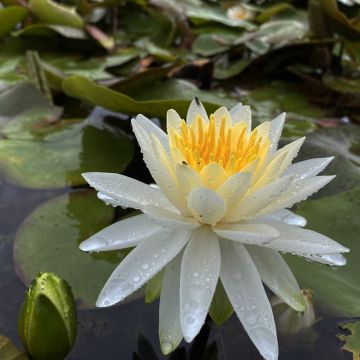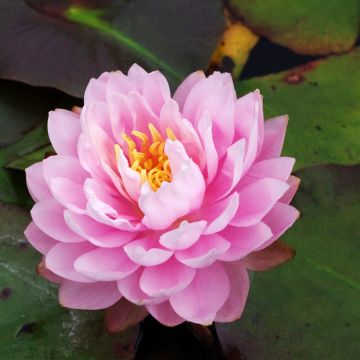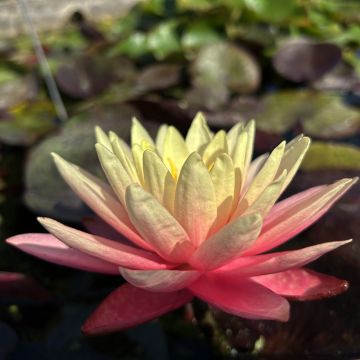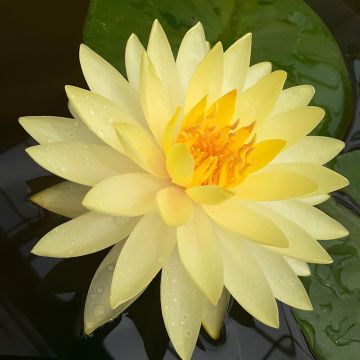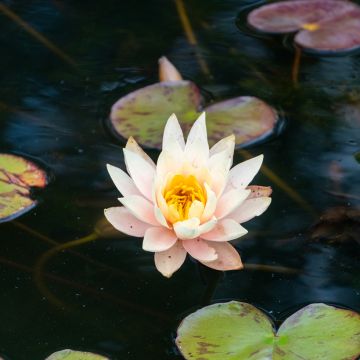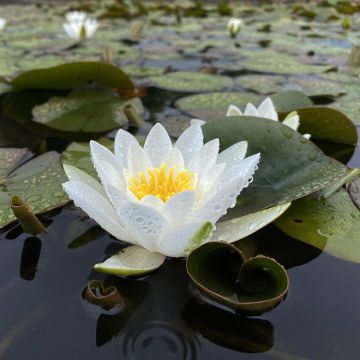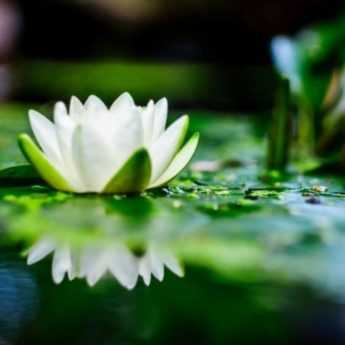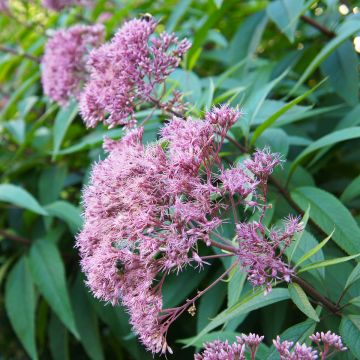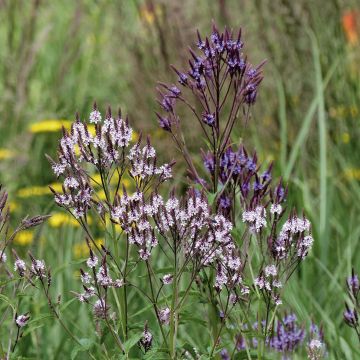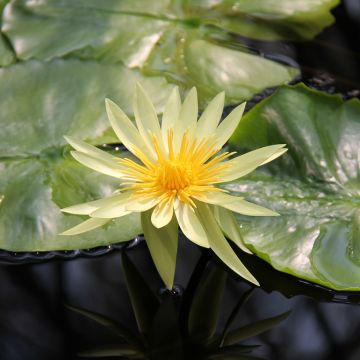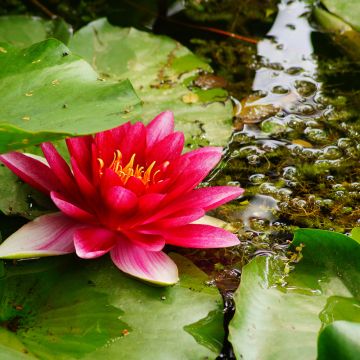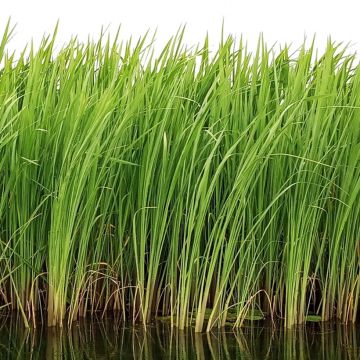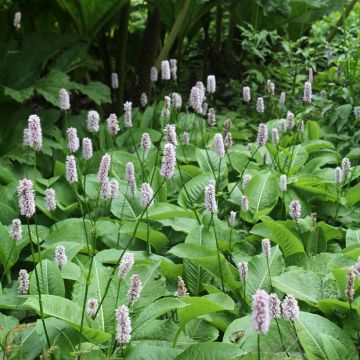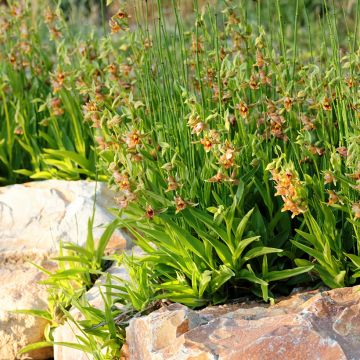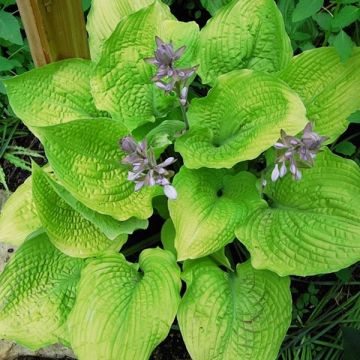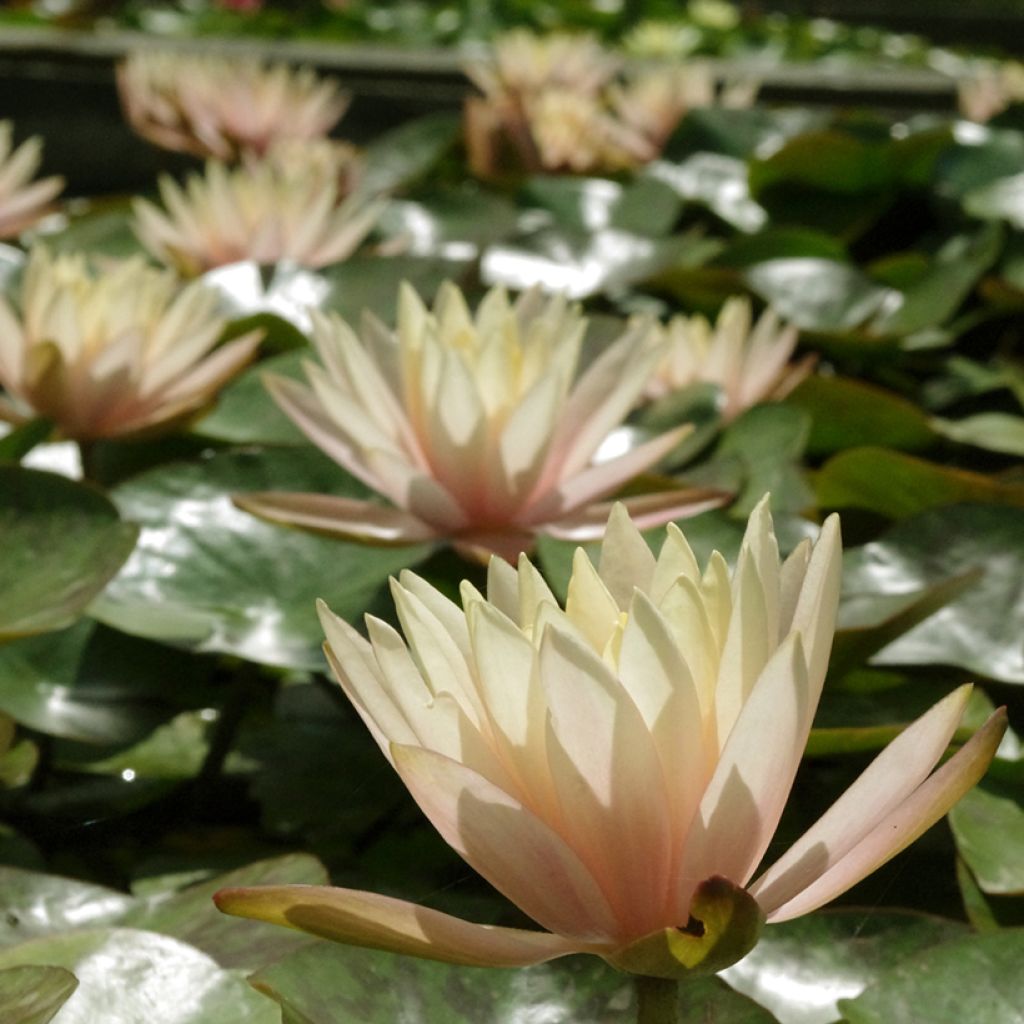

Nymphaea Cynthia Ann
Nymphaea Cynthia Ann
Nymphaea Cynthia Ann
Water Lily, Waterlily
Home or relay delivery (depending on size and destination)
Schedule delivery date,
and select date in basket
We guarantee the quality of our plants for a full growing cycle, and will replace at our expense any plant that fails to recover under normal climatic and planting conditions.
Description
The Nymphaea 'Cynthia Ann' is one of the hardy water lilies that produces the most flowers in a year: they bloom in small clusters for almost 6 months, from May to October. This medium to large cultivar is also distinguished by its beautiful flowers in soft and warm colours of dawn, carried by long peduncles above the water. It is a water lily suitable for medium to large bodies of water, its rhizome should be planted under 40 cm to 1 m of water.
The Nymphaea 'Cynthia Ann' is a creation of Dr. Robert Kirk Strawn (U.S.A) dating back to 2001. It is a aquatic perennial with deciduous foliage from the Nymphaeaceae family. This plant develops numerous floating leaves measuring 12 to 14 cm in diameter starting from spring. They are round and their sinus is open two-thirds, sometimes completely open or almost closed. The young leaves are tinted with bronze, then they turn dark olive green as they unfold, while retaining irregular brown or purple spots. The plant spreads over 1.20 m to 1.50 m. The early flowering usually begins in May and sometimes lasts until November, depending on the climate. The solitary flowers, 12 to 14 cm in diameter, emerge distinctly from the water. At blooming, they have a cup shape, then they open up like stars. The petals are lanceolate and pointed. They display a range of rich and soft colours including cream yellow, peach, and salmon pink with coppery reflections. They surround a cluster of dark yellow stamens. These corollas open during the day and close in the evening. Each flower lives for 4 to 5 days before withering, it returns underwater and is replaced by another flower. The flowering is followed by the formation of fruits containing numerous seeds. The fruit ripens underwater and releases floating seeds that will eventually sink and germinate in the mud. Water lilies are hardy as long as their rhizome does not freeze in winter. It is important to ensure that the water does not freeze at the depth where they are planted.
Choose varieties of water lilies that are easy, hardy, and floriferous, and above all, those that are proportionate to your pond. With their perfectly shaped flowers, Nymphaeas are among the most beautiful perennial pond plants. Most of them bloom for many weeks, until early autumn. The water lily is an essential aquatic plant for maintaining the balance of a garden pond, as it contributes to the oxygenation of the water. Its leaves floating on the water's surface will provide shade and shelter for your fish, which in return will protect them from predatory insects such as aphids.
The genus name comes from the Greek nymphaia and the Latin name nymphaea, which means "water lily". They were inspired by the nymphs of Greek and Latin mythology. Nymphaea bears flowers that are sometimes diurnal, sometimes nocturnal, and occasionally fragrant.
Report an error about the product description
Other Hardy water lilies
View all →Planting and care
The rhizome of the 'Cynthia Ann' water lily should be planted from March to June at a depth of 40 cm to 1 m, it must not freeze in winter. Plant the rhizomes of hardy water lilies in good garden soil, rich in clay or silt and free of stones (never use potting soil, it is too rich and promotes the development of algae). Give them the sunniest spot in the water feature. Space each rhizome at least 1 m apart and plant them by inserting them vertically into the soil up to the collar. In the case of a natural water feature (pond or lake), make sure that the water level remains fairly stable and that the water is neither too acidic nor too alkaline (desired pH between 6.5 and 7.5).
The rhizomes can be planted in a wicker basket or a fine mesh basket that is sunk in the desired location. For classic hardy water lilies, use a pot with a diameter of 40 cm (wider than it is tall). If the bottom is muddy, simply attach a stone to the rhizome and throw the whole thing to the desired location. Never leave the Nymphaea rhizomes exposed to the sun or air to prevent them from drying out; plant them as soon as you receive or purchase them.
If you have fish in your pond, it is preferable to spread a thick layer of large gravel on the surface of the planted pot to deter them from digging into the soil and thus fouling the water. The development of water lilies will be optimal if they are planted in containers suitable for their growth.
Water lilies are hungry plants: distribute a balanced slow-release fertiliser at planting, and then every year at the beginning of the growing season. During the summer, remove excessive leaves that grow in the centre of the clump and keep only the most vigorous ones. Also remove yellowed or stained leaves as well as aquatic weeds that emerge from the surface.
Planting & care advice
This item has not been reviewed yet - be the first to leave a review about it.
Similar products
Haven't found what you were looking for?
Hardiness is the lowest winter temperature a plant can endure without suffering serious damage or even dying. However, hardiness is affected by location (a sheltered area, such as a patio), protection (winter cover) and soil type (hardiness is improved by well-drained soil).

Photo Sharing Terms & Conditions
In order to encourage gardeners to interact and share their experiences, Promesse de fleurs offers various media enabling content to be uploaded onto its Site - in particular via the ‘Photo sharing’ module.
The User agrees to refrain from:
- Posting any content that is illegal, prejudicial, insulting, racist, inciteful to hatred, revisionist, contrary to public decency, that infringes on privacy or on the privacy rights of third parties, in particular the publicity rights of persons and goods, intellectual property rights, or the right to privacy.
- Submitting content on behalf of a third party;
- Impersonate the identity of a third party and/or publish any personal information about a third party;
In general, the User undertakes to refrain from any unethical behaviour.
All Content (in particular text, comments, files, images, photos, videos, creative works, etc.), which may be subject to property or intellectual property rights, image or other private rights, shall remain the property of the User, subject to the limited rights granted by the terms of the licence granted by Promesse de fleurs as stated below. Users are at liberty to publish or not to publish such Content on the Site, notably via the ‘Photo Sharing’ facility, and accept that this Content shall be made public and freely accessible, notably on the Internet.
Users further acknowledge, undertake to have ,and guarantee that they hold all necessary rights and permissions to publish such material on the Site, in particular with regard to the legislation in force pertaining to any privacy, property, intellectual property, image, or contractual rights, or rights of any other nature. By publishing such Content on the Site, Users acknowledge accepting full liability as publishers of the Content within the meaning of the law, and grant Promesse de fleurs, free of charge, an inclusive, worldwide licence for the said Content for the entire duration of its publication, including all reproduction, representation, up/downloading, displaying, performing, transmission, and storage rights.
Users also grant permission for their name to be linked to the Content and accept that this link may not always be made available.
By engaging in posting material, Users consent to their Content becoming automatically accessible on the Internet, in particular on other sites and/or blogs and/or web pages of the Promesse de fleurs site, including in particular social pages and the Promesse de fleurs catalogue.
Users may secure the removal of entrusted content free of charge by issuing a simple request via our contact form.
The flowering period indicated on our website applies to countries and regions located in USDA zone 8 (France, the United Kingdom, Ireland, the Netherlands, etc.)
It will vary according to where you live:
- In zones 9 to 10 (Italy, Spain, Greece, etc.), flowering will occur about 2 to 4 weeks earlier.
- In zones 6 to 7 (Germany, Poland, Slovenia, and lower mountainous regions), flowering will be delayed by 2 to 3 weeks.
- In zone 5 (Central Europe, Scandinavia), blooming will be delayed by 3 to 5 weeks.
In temperate climates, pruning of spring-flowering shrubs (forsythia, spireas, etc.) should be done just after flowering.
Pruning of summer-flowering shrubs (Indian Lilac, Perovskia, etc.) can be done in winter or spring.
In cold regions as well as with frost-sensitive plants, avoid pruning too early when severe frosts may still occur.
The planting period indicated on our website applies to countries and regions located in USDA zone 8 (France, United Kingdom, Ireland, Netherlands).
It will vary according to where you live:
- In Mediterranean zones (Marseille, Madrid, Milan, etc.), autumn and winter are the best planting periods.
- In continental zones (Strasbourg, Munich, Vienna, etc.), delay planting by 2 to 3 weeks in spring and bring it forward by 2 to 4 weeks in autumn.
- In mountainous regions (the Alps, Pyrenees, Carpathians, etc.), it is best to plant in late spring (May-June) or late summer (August-September).
The harvesting period indicated on our website applies to countries and regions in USDA zone 8 (France, England, Ireland, the Netherlands).
In colder areas (Scandinavia, Poland, Austria...) fruit and vegetable harvests are likely to be delayed by 3-4 weeks.
In warmer areas (Italy, Spain, Greece, etc.), harvesting will probably take place earlier, depending on weather conditions.
The sowing periods indicated on our website apply to countries and regions within USDA Zone 8 (France, UK, Ireland, Netherlands).
In colder areas (Scandinavia, Poland, Austria...), delay any outdoor sowing by 3-4 weeks, or sow under glass.
In warmer climes (Italy, Spain, Greece, etc.), bring outdoor sowing forward by a few weeks.



































